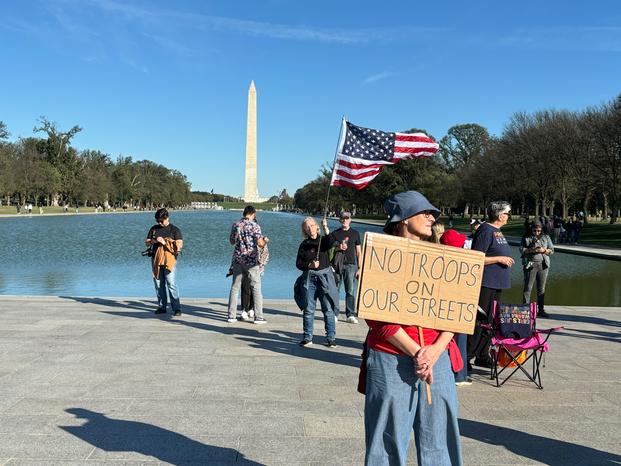On a brisk October afternoon in Washington, D.C., the familiar steps of the Lincoln Memorial once again became a stage for Americans demanding accountability.
On the eve of the "No Kings" that ultimately drew millions nationwide on Saturday, Oct. 18, a large demonstration in the nation's capital opposed the expansion of executive power by President Donald Trump. Military veterans gathered with local activists for a smaller event hosted by Indivisible, a civic group formed in response to President Donald Trump’s re-election.
For four hours on Friday afternoon, about 150 people cycled through the Unite the DMV (District of Columbia, Maryland, and Virginia) gathering that brought together former government employees, community organizers and veterans united by one message: defending democracy.
Veterans part of affiliated groups spoke to Military.com before the protests as they were ready to engage in events throughout the United States.
Bobby R. Jones, a U.S. Navy veteran and president of Veterans for Responsible Leadership, said his organization joined because “it’s vital that veteran organizations remain at the forefront of protests like the 'No Kings' rally.”
“Every service member takes an oath to support and defend the Constitution of the United States against all enemies, foreign and domestic. Today, we face a commander-in-chief who is blatantly misusing his authority, seemingly hoping that military members will forget the very oath they swore to uphold,” Jones said.

He pointed to deeper frustrations in the veteran community: ongoing Department of Veterans' Affairs staffing shortages, federal job losses, and the strain of the government shutdown—which has delayed pay for active-duty personnel.
“Many in the veteran community feel forgotten—or worse, abandoned," he said. "The drastic reduction in staffing at the Department of Veterans Affairs has been devastating. The elimination of federal jobs, of which roughly 30% are held by veterans, compounds that harm.
“The ongoing government shutdown has intensified the hardship faced by active-duty personnel and their families. And perhaps most egregiously, the use of the National Guard to round up homeless Americans—many of whom are veterans— is unconscionable."
VA spokesperson Peter Kasperowicz cited a July press release to Military.com, which states: “VA has multiple safeguards in place to ensure these staff reductions do not impact Veteran care or benefits. All VA mission-critical positions are exempt from the deferred resignation program and voluntary early retirement authority, and more than 350,000 positions are exempt from the federal hiring freeze.”
For Jones, the rally was as much about solidarity as protest, hoping that the following day's event sent a "clear message."
“No one, not even a commander-in-chief, is above the Constitution," he said.
Gliding Into 'Authoritarian Direction'
That sentiment was echoed by Michael McPhearson, executive director of Veterans for Peace, who told Military.com that cuts to the Veterans Health Administration have made life harder for those who served.
Some VA employees, he noted, are veterans themselves now stretched thin by staffing reductions and threats to disability benefits.
“The administration is authoritarian and is moving in an authoritarian and fascist direction,” McPhearson said. “Those go directly against the values that most veterans have. The government promised to take care of veterans because of their service, and that promise is being broken.”
Vets Gather For Democracy
One of those who gathered in D.C. the Friday before the widespread protests and rallies was Jermaine Collins, a U.S. Army veteran and Washington D.C. lead organizer for Common Defense, the country’s largest progressive veterans’ network.
Taking the mic before the reflecting pool, Collins recalled his service with pride but also deep concern for what he sees unfolding at home.

“When I used to wear the uniform, I did so with pride. I served this country because I believe in the promise of freedom, equality and democracy,” Collins told the crowd. “But what I've seen happening here in D.C. and in other cities around the country is not in the defense of freedom. It's the slow, deliberate dismantling of it.”
Collins condemned the continued deployment of the National Guard in D.C., saying it's “not about security, but intimidation.”
“When the military is deployed against its own citizens we don't call that freedom, we call that authoritarianism," Collins said. "I didn't risk my life overseas to come home and see armed troops walking around the streets of my city, my home."
He ended with a reminder that D.C.’s roughly 700,000 residents still lack voting representation in Congress, an issue veterans say cuts directly against the democratic ideals they fought to defend.
'No Kings' Brings Big Crowds
The next day, those ideals were on full display as more than 200,000 people flooded Pennsylvania Avenue for the "No Kings" protests that have grown since Trump's inauguration in January.
The movement, backed by more than 200 partner organizations including several veteran-led groups and others like the League of Women Voters, 50501 and American Civil Liberties Union, called for limits on executive authority.
For many veterans in attendance, it was not their first protest but it may have been their most personal.
Among the crowd on Saturday was Shawn Howard, a U.S. Marine Corps veteran and founder of American Veterans in Defense of Democracy.
Holding a sign that read “USMC combat vet Iraq, tell me I hate America,” Howard said he came out because “our democracy is in peril.”
“I took great offense at [House] Speaker Mike Johnson’s words calling Americans who are exercising their First Amendment rights as hating America,” Howard said. “People need to stand up and tell their elected officials that they’re not going to stand for it.”
For Howard, the protest was less about party than principle.
“I was concerned when Trump first came onto the political scene because he was clearly very illiberal and not dedicated to our democracy,” he said. “After January 6, 2021, I knew I had to oppose what was going on.”
Updated 10/22/25, 3:06 p.m. ET: This story was updated with comment from the VA.











